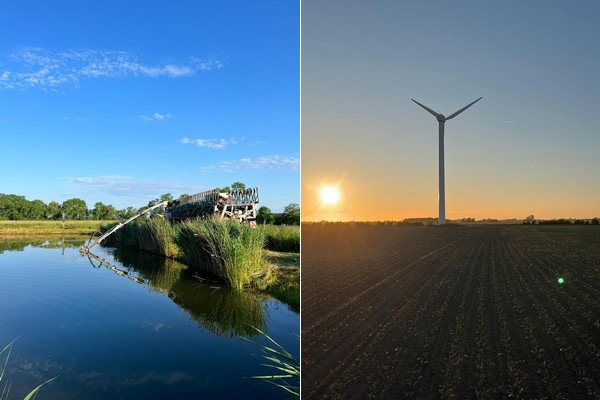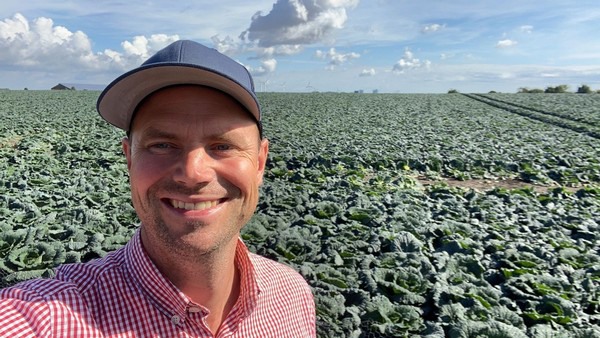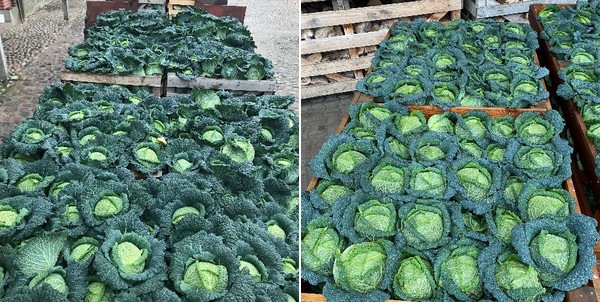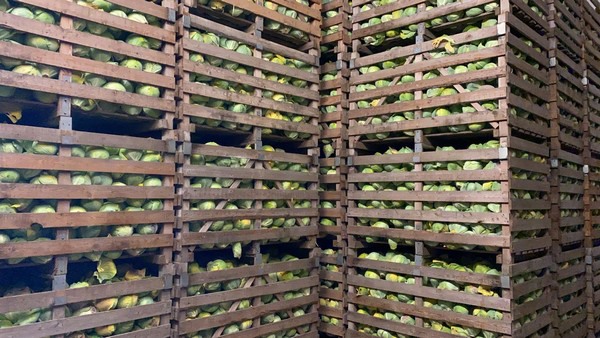This year's cabbage harvest on the island of Fehmarn is now in the starting blocks. "We start the season in about two weeks and the yields here will probably be average to slightly below average. Because in summer it was drier than ever here, too. At the beginning of May we still had about 10 mm of rain, then there was no more precipitation until July. Since our fields are not under irrigation, we applied drinking water to the fields for the first time. We were also lucky that we still had plenty of moisture in our clay soils," says Peter Joachim Witt, cabbage producer and owner of Witt Insel-Gemüse GmbH & Co. KG looking back.
 Due to the lack of rainfall, the fields had to be additionally irrigated.
Due to the lack of rainfall, the fields had to be additionally irrigated.
The island on the Baltic Sea coast is especially known for its savoy cabbage cultivation. Thanks to the optimal conditions, above all the modern storage capacities, the savoy cabbage produced there can often be marketed throughout Germany until March of the following year. "The 22/23 marketing season went very well overall, the outflow was continuous and the producer prices were also at an average level of 0.50 euros/kg. Our warehouses were empty in mid-March, while there were also years when we sold out only at the end of March-beginning of April. The somewhat earlier end of the season actually fits quite well, as Fehmarn is home to mostly mixed farms that are also involved in arable farming and are also active in tourism," says Witt, who markets not only his own yields but also the goods of many colleagues.
 In addition to arable farming, Peter Joachim Witt is also involved in the cultivation of red, white and savoy cabbage. Of the total area under cultivation, about 50 ha are devoted to cabbage (35 ha of which are savoy cabbage).
In addition to arable farming, Peter Joachim Witt is also involved in the cultivation of red, white and savoy cabbage. Of the total area under cultivation, about 50 ha are devoted to cabbage (35 ha of which are savoy cabbage).
Stable market niche
In the last four years, the farm's cabbage cultivation has roughly doubled, Witt continues. Savoy cabbage has established itself as an extremely stable and consistent product mainstay. "Prices never go through the roof and there are sometimes high logistics costs due to transport to central and southern Germany. At the same time, we never have the problem that the goods don't flow out for some reason. When imported goods hit the market afterwards, whether from Portugal, Spain, France or Italy, we have already disappeared from the market. To that extent, we have found our niche and we don't get in each other's way at all with the imported product."
 The average head of savoy cabbage weighs about 1.2 to 1.5 kg, which corresponds to a packing unit of about 6-8 heads/box. The desired unit weight for red and white cabbage, on the other hand, is 2 to 2.5 kg.
The average head of savoy cabbage weighs about 1.2 to 1.5 kg, which corresponds to a packing unit of about 6-8 heads/box. The desired unit weight for red and white cabbage, on the other hand, is 2 to 2.5 kg.
Increasing pest problems
According to Witt, the biggest challenge in the near future lies in particular in the consequences of climate change, which are also increasingly causing problems for the cabbage producers on Fehmarn. This is reflected in particular in the increasing pest problem. "The earlier we plant the savoy cabbage, the more problems we have with whiteflies, which is why we only plant from week 24. Until eight years ago, this problem did not exist at all. If the weather stays like it is now, we would be happy. But if we have temperatures around 20 degrees again in November, the fly will be back in the crop. During processing, we can clean off most of the infested leaves, but this means that we lose mass. This in turn reduces the net yield per hectare," concludes Witt.
 A look into the cabbage store: Thanks to excellent storage capacities on the island of Fehmarn, cabbage is in plentiful supply until March.
A look into the cabbage store: Thanks to excellent storage capacities on the island of Fehmarn, cabbage is in plentiful supply until March.
Pictures: Witt Insel-Gemüse GmbH & Co. KG
For more information:
Peter Joachim Witt
Witt Insel-Gemüse GmbH & Co. KG
Blieschendorf 6
23769 Landkirchen / Fehmarn
Telefon +49(0)4371 - 3527
Telefax +49(0)4371 - 2856
Mobil +49(0)178 - 4804982
E-Mail: info@insel-gemuese.de
Webseite: https://www.insel-gemuese.de
